A reader asked about Metal Gear Rising: Revengeance:
I’ve read some stuff on Gamefaqs regarding the localization of the last-released Metal Gear title, Metal Gear Rising: Revengeance and apparently the Japanese version is a little more serious than the English version which goes for a so corn-ball its awesome sort of thing. The scene I’ve seen compared the most is the Jack the Ripper scene. But there’s one codec scene where they mention a “DOOMP” which is an obvious pun.
Also, a character named George talks with an accent I assume is Guyanese, and I wanna know if there’s an equivalent in the Japanese version.
TL;DR What’s going on with the Japanese versions of the DOOMP scene and the way this annoying kid talks?
Taking a DOOMP
This apparently takes place after where I left off in the game, so finding it in both versions took a little time. First, here’s the full English version of the scene in question:
And here’s the particular line in question:
 | 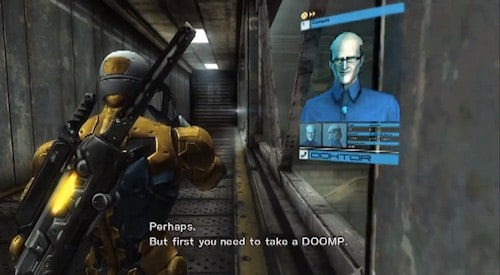 |
| Japanese Version (basic translation) | English Translation |
| Doktor: That appears to be the maintenance area for unmanned gear. | Doktor: Ah, this would appear to be the UG maintenance area. |
| There might be a terminal somewhere for inputting mission parameters to the unmanned gear. | You should find a terminal there — something they use to upload mission parameters to their UGs. |
| Raiden: And with that we could access the lab’s server? | Raiden: And something I can use to access the lab’s main server? |
| Doktor: Possibly. But we could really use a springboard. | Doktor: Perhaps. But first you need to take a DOOMP. |
| Raiden: Don’t worry. I can jump pretty high. | Raiden: I… Wait, what? |
| Doktor: That isn’t what I mean. I’m referring to a hacking springboard. It’s a programming thing. | Doktor: A DOOMP? A digital-optical output mounted proxy. You’ll need one to interface with the terminal. |
| A Tripod or the like will do. I’m very familiar with their inner workings, after all. | Most any UG should suffice — a Tripod or the like. |
| Raiden: I’ll look for one. But how do I make a springboard out of it? | Raiden: I’ll see what I can come up with. How do I use it? |
| Doktor: Simply connect to it directly. | Doktor: Simply connect to it. |
| You can then use your communications capabilities to take control of the Tripod. | You should be able to use your communications outlay to control the proxy UG. |
| Raiden: I’ll give it a shot. | Raiden: All right, let’s give it a shot… |
So where the DOOMP joke is in the English script, it looks like the Japanese script has some fun with a word for “springboard” or “step stool” or “stepping stone”. To this, Raiden replies that he can already jump pretty high.
Since this game was developed by a Western studio (I think? Or am I thinking of a different game?) I don’t want to assume that the script was necessarily set in stone in Japanese first, so I’m not really sure which joke came first. If anyone can shed light on the details, though, let me know in the comments!
In any case, the Japanese script doesn’t have a bathroom joke. In fact, I’d be kind of surprised if it did here, since it seems like the trend among some Japanese games lately is to avoid and/or remove references to feces and urine. Even MOTHER 2’s re-releases made a few changes to remove these things specifically (example). I’ve often wondered if it could be a CERO thing.
How George Talks
Anyway, the next question David had was: does George speaks with such a heavy accent or dialect in the Japanese text? The quick answer is no.
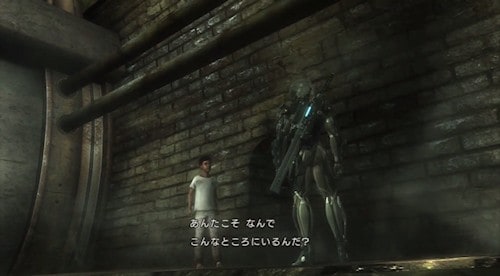 | 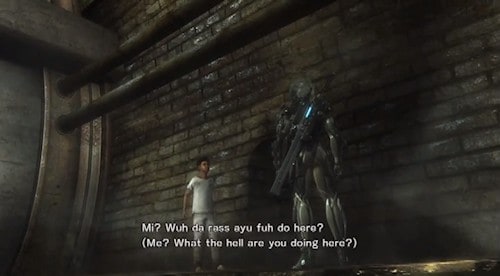 |
First, here’s a look at George talking in both versions of the game. Even if you don’t speak Japanese, you can probably tell that George isn’t speaking in any unusual way:
I’ve found that in general, Japanese entertainment writers prefer to play with local Japanese dialects and accents, and only if it makes sense to. If a character really needs to be seen speaking in a “foreign dialect” way – maybe just for verbal decoration – then it’s common to just drop a foreign word into the middle of a Japanese sentence and call it a day:
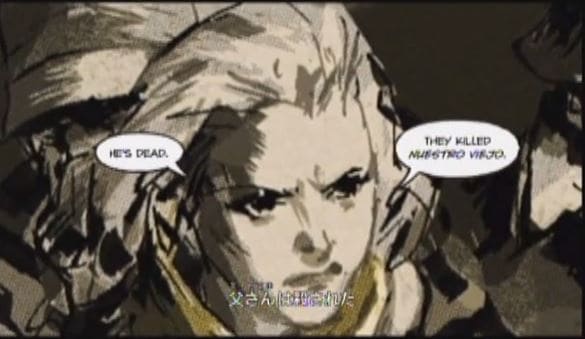 |
Basically, George doesn’t talk in any odd way in the Japanese version of Metal Gear Rising. It looks like the localizers opted to do a lot of research and hard work to make him sound more authentic in English, though, which is why he sounds the way he does in the English version of the game.
With all that aside, I’m really curious to know how this DOOMP thing and George’s speech style was handled in other translations of the game. If you know, plese share in the comments!


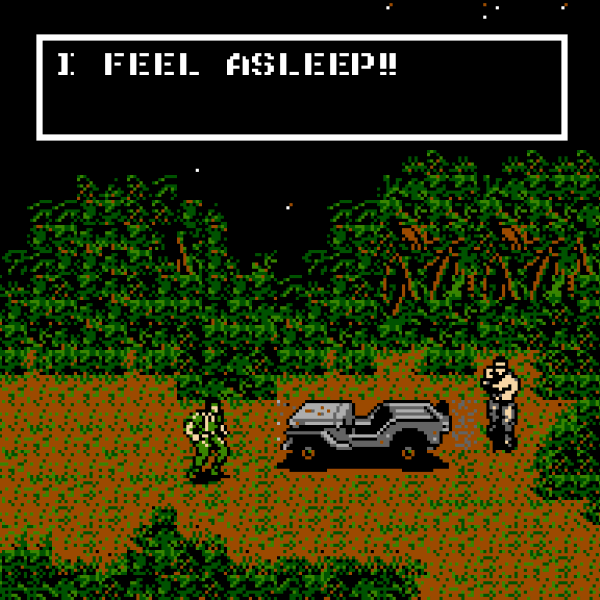
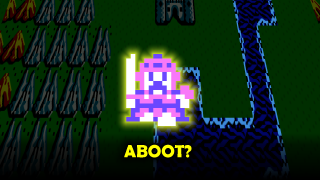


What does the changed MOTHER 2 line say?
She calls him a “toilet fly” but this was changed to just “fly”. The mayor’s line about making the Sharks pee their pants was removed in M1+2 or the Wii U version, I can’t remember. There were a few other things too that I still need to document.
Mato: in response to your alt text, this game has some completely insane (and awesome) stuff, all the way to the end. If you don’t have the time to play it yourself, I highly suggest the Chip and Ironicus LP of this game.
http://www.youtube.com/playlist?list=PLrekaHLD2rhZqKlQwB9549iJSnABQUi_Y
“Since this game was developed by a Western studio I don’t want to assume that the script was necessarily set in stone in Japanese first, so I’m not really sure which joke came first.”
…Huh? Platinum Games is very much a Japanese studio, not a Western one. I can understand why you’d be confused though since they’re the only Japanese developer outside of Nintendo that can still make good games.
Oh wait, maybe I’m thinking of whoever was developing the earlier version of the game? I seem to recall it was stuck in development hell for many years and that it might’ve switched developers.
Nope, originally it was being made by KojiPro but they couldn’t finalize their ideas or implement them well. The whole story can be found here: http://www.youtube.com/watch?v=gV1BMUg4NsA
Also the localization was done by 8-4, which is why everything about it is so good.
Ah, that makes sense then. Between the “Go, Ninja Go” reference and things like this DOOMP joke, it seriously had me wondering if the English was what was written first. If there’s ever an indicator of a quality localization, that uncertainty is probably it.
I’ve never heard of this “8-4” tell me more…?
http://en.wikipedia.org/wiki/8-4
8-4 is a difficult and final level of Super Mario Bros.
xD
Oh, you!
To be fair, though, Platinum DOES write games in English, though. The entirety of Bayonetta 1 is English-only and was released with subtitles in Japan. I don’t know how MGR was written, but if it turned out that Platinum had done it in English first, that wouldn’t be too out of the ordinary.
To find out why some Japanese developers will write things in English, click he– wait, that’s your line!
I find it funny how the situation has changed. Japan used to leave in jokes about toilet humor (look at Dr. Slump for pete’s sake, I mean yikes Toriyama sure loved poop jokes) and North America was the one whitewashing that stuff when material came here. Now it’s the reverse. XD
I couldn’t agree more about Shakespearean text. I don’t know if you have played it, but Tactics Ogre: Let Us Cling Together on the PSP, is what I like to call “overwritten” and totally Shakespearean.
If you have a game which has a complicated plot about waring nations, civil feuds etc, for the love of god, do not make it harder to follow by having characters talk in heavy Shakespearean English.
and it’s not just because I don’t get it, I’m British and did Shakespeare in class when I was younger and I hated it then.
That reminds me, a little anecdote you may enjoy Mato, Not sure if you have played it but I’ve been replaying Final Fantasy Tactics Advance on the GBA. A wonderful little game which as far as I can tell is brilliantly localized. The speech is simple but engaging and easy to understand (I played the game when it came out when I younger and it was a joy to play because it was so easy to understand, without dumbing it down, the strong themes of unhealthy escapism are still there).
But out of the entire localization, there is one part that stuck out like a sore thumb, as if the translator fell asleep or something.
I can’t find the specific scene on youtube, but there is a part where the character Shara is talking to another called Ritz. Ritz is obviously the more informal character as shes from the real world and Shara is extremely formal as she is from the Final Fantasy world. But out of nowhere, Shara speaks extremely out of character; “As long as you would be cool with that?”
Just one sentence but it has stuck with me since, because it just seems so out of character and it could of easily been reworded to “As long as that’s fine with you?” or something.
Ever since I’ve started reading your blog, I’ve been noticing little strange translation choices in games, especially when it comes to formal characters. It’s fantastic, because I honestly never would of known how difficult it is to localize a game correctly.
Also, I have a question, since you know Japanese, do you play Japanese games over English? Or do you wait for it to come out in the states? Anyway, keep up the good work!
Shana probably picked up a bit of Ritz’s speaking habits and that’s what the comment was implying, though if they put quotations around cool, that implication would have been easier to make.
Wherefore doth thou not likest mine accent?
‘Wherefore likest not thou mine accent?’ or ‘Wherefore dost thou not like mine accent?’
The sense of “like” was reversed (like gustar in Spanish) in Shakespeare’s English*, so you’d want “Wherefore mine accent likes thou not?” or “Wherefore does mine accent like thou not?”.
* “The music likes you not?” “You mistake; the musician likes me not.” — Two Gentlemen of Verona, Act IV, Scene II.
I for one am hoping for an RPG with a Middle English (Chaucerian) script.
You being English has nothing to do with anything. Just because you were born in the same country as a fellow hundreds of years before you was doesn’t mean that you have anything in common with them.
Furthermore, you’re just unhappy because you don’t like Early Modern English.
Well, here’s some news: some people do.
I’m surprised they changed the dialog in a Mother game, considering that’s about the biggest draw. I’m glad it was such a minor change, but really, CERO seems like it’s been interfering with things. Is CERO a legally enforced ratings agency, or merely an industry standard with no legal backing at all, like the ESRB in America?
Man, that’s certainly an interesting tidbit if I say so myself. Still, if you have time, you should go ahead and analyse the FFX at some point. Like, analyse how the Macarena/Macalania joke was handled in the Japanese version and stuff.
Ok, there’s an another matter from Metal Gear Rising that you should take a look at. As you might know, the Japanese Version has white blood for Cyborgs and the English Version has red. There’s a codec call where Raiden discusses the advantage of the red blood versus the white one. I wonder if you should take a look at how this discussion is handled in the Japanese Version.
BTW, im always weirded out as americans don`t get spanish at all. How they came to believe that articles are part of proper nouns ? Do they notice how weird it sounds but still keep it because it`s funny or something ? For instance, they say stuff like the “la cia” or the “la revolucion”. Do they do the same when it comes to say french or italian ?
Typically, the translations of Spanish nouns are listed in Spanish textbooks for English speakers that way (presumably to convey the gender of the noun, which wouldn’t be immediately apparent otherwise).
Spanish is a Romance language and English is an Insular West Germanic language.
…Why exactly should English speakers understand Spanish?
Well, I was reading this article now and decided to check it in the Brazillian Localization of Metal Gear Rising. Firstly, the game was not dubbed in Brazillian portuguese, it was only subtitled, this way I could not see how George’s style of speech would be handled in my language, as in subtitles there are characters limits and therefore some aspects of spoken language are lost. However, it was subtitled with informal speech. For example, “you” was translated to “cê”, which it would be a informal way of saying “você”(you), with the first syllable was left out. Example: What do you want = “o que você quer?”, but in an informal spoken way = “que ‘cê quer?”. The doomp pun was handled very well, and, as it is present in the Brazillian version, I am pretty sure it was translated directly from English. I am not sure why, but this is type of translation, “triangular translation”, is very common in Brazillian Portuguese. But in this version, Raiden does not “take a dump”, he “farts”. The pun was made by linking the word “peido” (fart – in its noun form) with the initials created of “PESDO”, which is “Proxy equipado com saída digital óptica”, and can be translated roughly to “A digital-optical output mounted proxy”.
That moment when you are reading your own text, realize you made a few mistakes, and cannot edit it. T-T
I suspect your “springboard” is what in English we’d call a trampoline. As the dialogue says, it’s a programming thing; there’s a Wikipedia page.
Say you have some code written to a ROM chip, but you want to be able to change what part of it does when it’s run anyway. What you do is write a ‘jump’ instruction (which controls what code is executed next) into RAM, then write the code you want to be able to change to jump to that jump instruction. Now you can change how that code behaves by changing the destination of the ‘jump’ in RAM.